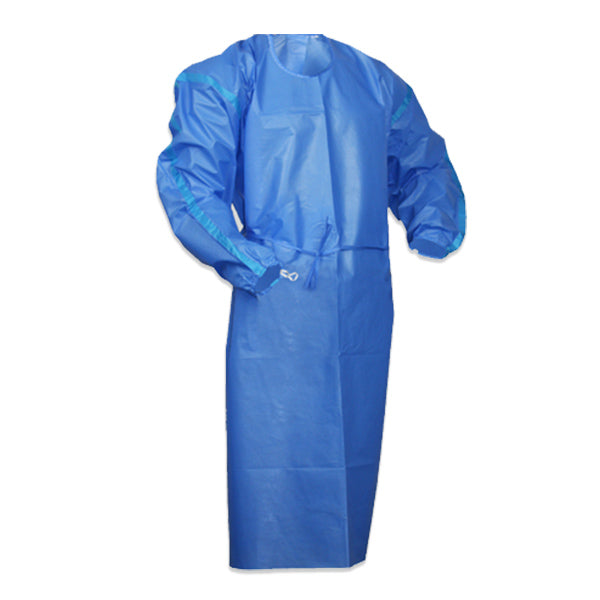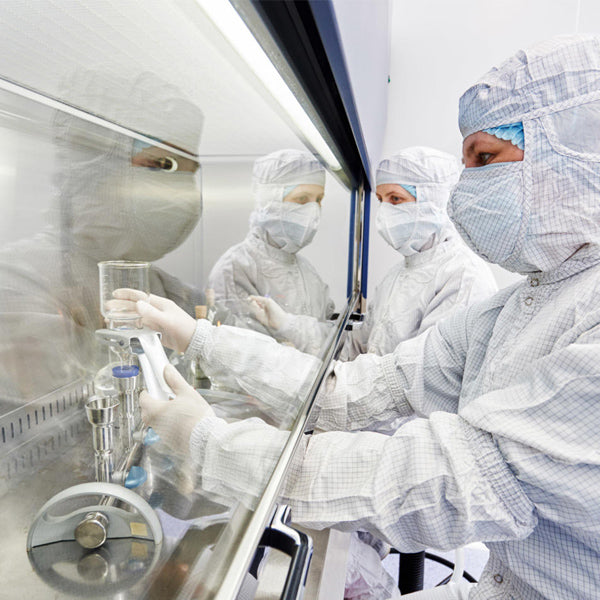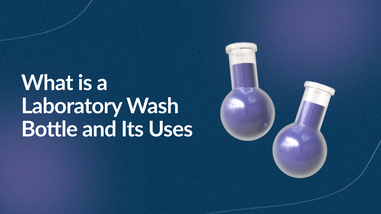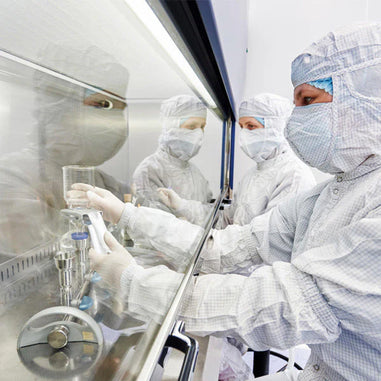- No products in the cart.
The compounding of hazardous drugs (HDs) in pharmacies is a complex and potentially risky process that demands stringent safety protocols to protect healthcare workers, patients, and the environment. The United States Pharmacopeia (USP) General Chapter <800> outlines the standards for handling HDs to minimize exposure to these substances. Compliance with USP <800> is crucial for any facility involved in the storage, preparation, transport, and administration of hazardous drugs. This guide will detail the personal protective equipment (PPE), lab supplies, procedures, disinfectants, and state board approvals required to ensure safety in USP <800> pharmacies.
The Importance of USP <800> Compliance
USP <800> was established to provide guidelines for the safe handling of hazardous drugs in healthcare settings, including pharmacies. Hazardous drugs can pose significant risks, such as reproductive toxicity, carcinogenicity, organ toxicity, and genotoxicity. Therefore, adhering to these standards is not just a regulatory requirement but a critical component of workplace safety.
Essential PPE for USP <800> Compliance
Personal protective equipment (PPE) is a cornerstone of safety in USP <800> compliant pharmacies. The appropriate use of PPE significantly reduces the risk of exposure to hazardous drugs. Below are the essential PPE items required:
-
USP 800 Gowns:

- USP 800 Gowns must be disposable, non-permeable, and made of materials that offer adequate protection against the type of hazardous drugs being handled. They should have long sleeves with closed cuffs and be tied at the back.
- Gowns should be changed every 2-3 hours or immediately if contaminated, torn, or after each use when compounding sterile preparations.
-
- Chemotherapy-tested gloves are mandatory. Two pairs of gloves should be worn: an inner glove placed under the gown cuff and an outer glove over the cuff.
-
Gloves must be powder-free and made from nitrile, latex, or neoprene materials. They should be changed every 30 minutes or immediately if torn or punctured.

-
Masks and Respiratory Protection:
- While surgical masks do not provide sufficient protection against hazardous drug aerosols and vapors, they are necessary during non-sterile compounding to protect against splashes.
- N95 respirators or powered air-purifying respirators (PAPRs) are recommended for tasks that may generate airborne particles, such as spill clean-ups.
-
Eye and Face Protection:
- Goggles or face shields should be used when there is a risk of splash or spill. Regular prescription glasses do not offer adequate protection.
-
Shoe Covers:
- Disposable shoe covers should be used to prevent contamination from being tracked out of the compounding area. They must be changed before exiting the hazardous drug area.
Lab Supplies Required for USP <800> Pharmacies
Proper lab supplies and equipment are crucial to maintaining a safe environment in USP <800> compliant pharmacies. Some of the essential supplies include:
-
Biological Safety Cabinets (BSCs):
- Class II BSCs or compounding aseptic containment isolators (CACIs) are necessary for sterile hazardous drug compounding. These cabinets provide both product and environmental protection.
-
Closed System Transfer Devices (CSTDs):
- CSTDs help minimize the risk of drug aerosolization and spills during the transfer of hazardous drugs. They are an important component of safe compounding and administration.
-
Hazardous Drug Waste Containers:
- Designated, clearly labeled, and puncture-resistant waste containers must be available for the disposal of hazardous drug-related materials, including PPE and contaminated supplies.
-
Deactivation, Decontamination, and Cleaning Supplies:
- Cleaning solutions effective against hazardous drugs should be used for decontamination and deactivation of surfaces and equipment. Isopropyl alcohol, sodium hypochlorite, and specialized cleaning agents are commonly used.
Processes and Procedures
USP <800> outlines several critical processes and procedures to ensure the safe handling of hazardous drugs:
-
Receiving and Storage:
- Hazardous drugs must be received in a designated area and immediately transported to a storage area that is physically separated from non-hazardous drugs.
- Storage areas must have sufficient ventilation and negative pressure relative to adjacent areas.
-
Compounding Procedures:
- Compounding of hazardous drugs must be performed in a designated area with appropriate containment equipment (BSC or CACI).
- All personnel involved in compounding must be trained on safe handling practices and must adhere to strict hygiene protocols.
-
Transport and Administration:
- Use sealed containers and CSTDs to prevent leakage and contamination during the transport and administration of hazardous drugs.
-
Cleaning and Decontamination:
- Regular cleaning and decontamination of surfaces and equipment are mandatory. This includes deactivating any residual hazardous drug contamination, decontaminating with appropriate solutions, and cleaning all surfaces thoroughly.
Disinfectants and Cleaning Agents
The choice of disinfectants and cleaning agents is critical for USP <800> compliance. Commonly used agents include:
-
Deactivation Agents:
- Sodium hypochlorite solutions are effective for deactivating many hazardous drugs.
-
Decontamination Agents:
- Alcohol-based solutions, such as isopropyl alcohol, are used for surface decontamination.
-
Cleaning Agents:
- Non-shedding wipes and cleaning pads with approved cleaning agents are used for daily cleaning of surfaces and equipment.
-
Disinfection:
- After cleaning, surfaces must be disinfected with an appropriate agent such as 70% isopropyl alcohol to eliminate any microbial contamination.
USP 800 Training and Compliance
Delivering tailored compounded pharmaceuticals to patients requires the best in class of technical knowledge, raw materials, personnel, and protocol for every preparation. Here are a list of companies that offer excellent training to get you and your staff complaint:
- PCCA: PCCA provides pharmacists, pharmacy techs, and pharmacy owners with the resources, continuing education (ce), and tools.
- ACA: The American College of Apothecaries
- Medisca: Medisca offers robust training courses designed to educate pharmacy staff on USP <800> standards, covering topics such as proper PPE usage, hazardous drug handling protocols, and compliance documentation.
State Board of Pharmacy Approvals
Each state has its own regulations and requirements for pharmacies handling hazardous drugs. Most state boards of pharmacy require:
-
Documentation of Compliance:
- Pharmacies must document their compliance with USP <800> guidelines, including the use of proper PPE, equipment maintenance, and staff training records.
-
Inspections and Certifications:
- Many state boards conduct regular inspections to ensure that facilities are compliant with USP <800> standards.
-
Training and Certification:
- Pharmacy staff must undergo regular training on the safe handling of hazardous drugs, and certifications must be maintained as per state requirements.
Conclusion
Ensuring safety in USP <800> pharmacies is a multifaceted process that requires adherence to stringent guidelines for PPE, lab supplies, procedures, and state board approvals. By implementing these practices, pharmacies can protect their staff, patients, and the environment from the potential risks associated with hazardous drug compounding. Compliance is not only a regulatory requirement but a commitment to the highest standards of safety and care in the healthcare industry.
For over 45 years, Lab Pro Inc. . has been a trusted partner for pharmacy compounding professionals, providing premium lab equipment, chemicals, cleanroom supplies, hand tools, and PPE apparel. Valued by pharmacies, healthcare facilities, and laboratories worldwide, we are committed to delivering unparalleled quality in every product we offer. Enjoy the convenience of next-day service in California. Contact us online or call 888-452-2776 to discover customized solutions for your compounding needs. Elevate your compounding practices with Lab Pro Inc. – your partner in precision and excellence.












































